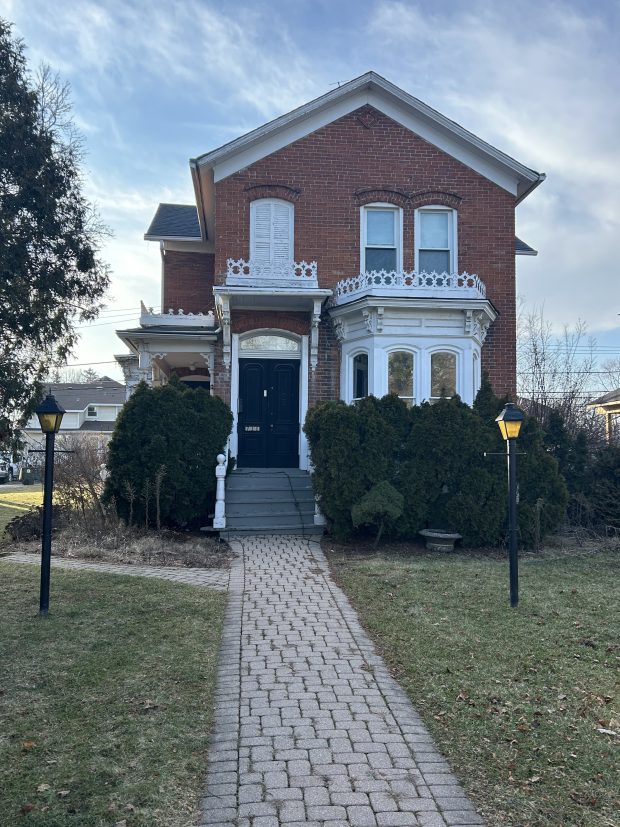An Arlington Heights “architectural gem” was saved from the wrecking ball after village trustees rejected a builder’s appeal to tear down the historic home located on a main thoroughfare in the northwest suburb.
“This would definitely alter the character of this neighborhood if this home would be torn down, and maintaining this home would be consistent with the village’s design guidelines,” Mayor Tom Hayes said.
The property, at 716 N. Dunton Ave., is one of only three Italianate architectural homes in the village, according to village leaders, and has stood as a landmark in the historic district for more than 140 years.
At its Feb. 5, 2024 meeting, the Arlington Heights Village Board listens to an appeal to rule against not allowing demolition of a 140-year-old house at 716 N. Dunton in Arlington Heights.

Mastercraft Builders purchased this 140-year-old house, at 716 N. Dunton in Arlington Heights, with the hopes of tearing it down to building a new one priced at
million or more. But at the Feb. 5, 2024 Village Board meeting, trustees voted to not allow demolition.
Vince Deligio, president of Palatine-based Mastercraft Builders, purchased the house and neighboring properties expecting to tear the existing structure down and build custom homes in its place and on adjacent lots, each with price tags of more than $1 million, according to information provided to the village.
When he went before the village’s Design Commission in October with plans to tear down the century-old house – which he deemed to be in “extraordinarily poor condition,” unsafe and beyond repair – to build a new home, he faced opposition from community members and ultimately was denied demolition by the Design Commission.
“We believe with great respect that they simply made a mistake. They should have granted demolition,” said Jerome Pinderski Jr., attorney for Mastercraft Builders who who spoke before the Village Board at its Feb. 5 meeting. “It simply is an older home that has no value … and no compelling story. It’s in poor condition and it is truly falling apart.”
Deligio’s appeal of the Design Commission’s decision came before the board as some 60 residents in attendance requested the board uphold the commission’s Oct. 10 ruling.
In rendering their decision, design commissioners said, “the existing historic house should remain and be preserved based on its significant architectural, historical, aesthetic, and cultural value.”
Village trustees did just that, voting 9-0 to keep with the Design Commission’s decision, and agreeing with more than two dozen residents who sent emails to village leaders stating that the structure has significant architectural, historical, aesthetic or cultural value – as outlined in village municipal code.
The house was also among 38 Arlington Heights homes identified as exceptional in the 2004 School of the Art Institute Community Preservation Report, which was challenged by the attorney but supported by trustees.
“This is a very unusual case. While we don’t have a historic preservation committee, we have a lot of beautiful historic homes,” said Trustee Jim Tinaglia. “Any one torn down would be a horrible loss to the character of our community. This is cultural, this is the community, this is what Arlington Heights is. You don’t have to love it or understand it. If you’re going to invest in Arlington Heights and take a chance and purchase from another investor, get educated really fast because you might end up with this kind of outcome.”
Village resident Martin Bauer spoke during the public comment portion of the meeting, saying the board’s decision puts a significant hardship on the property owner.
“We should protect the right of private owners to do what they see fit,” Bauer said. “I don’t think you should ignore the rights of property owners and force a financially unviable rehab. It’s a money pit.”
Deligio said he will not invest the more than $1 million estimated for repairs to the house, including rebuilding the foundation or fixing the basement because of flooding.
“We can’t rent it because it’s unsafe,” Deligio said, “we can’t sell it, we can’t tear it down. It will just sit there.”
Neighbors who live on either side of the house, who recently had their homes priced at $1 million or more built by Mastercraft Builders, expressed concern about the board’s decision.
“What happens next?” asked Justin Walsh, a father of three who lives next door to the two-story, red brick house. “What happens if this doesn’t get torn down or fixed?”
Hayes suggested the village should further define the limits it’s adhering to for houses such as this one and consider what this structure may look like five years from now.
“I’m hoping [that with] the publicity this home has garnered, a purchaser will come forward who is very interested in remodeling this very fine piece of architecture in our community,” Hayes said.
Elizabeth Owens-Schiele is a freelancer.



